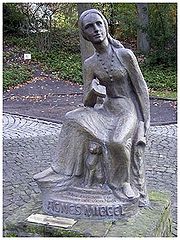
Agnes Miegel
Encyclopedia

Germany
Germany , officially the Federal Republic of Germany , is a federal parliamentary republic in Europe. The country consists of 16 states while the capital and largest city is Berlin. Germany covers an area of 357,021 km2 and has a largely temperate seasonal climate...
author, journalist, and poet
Poet
A poet is a person who writes poetry. A poet's work can be literal, meaning that his work is derived from a specific event, or metaphorical, meaning that his work can take on many meanings and forms. Poets have existed since antiquity, in nearly all languages, and have produced works that vary...
. She received the Kleist Prize for lyric in 1913, the Herder Prize in 1936, the Goethe Prize of the City of Frankfurt in 1940, the literature prize of the Bavarian Academy of Art (Literaturpreis der Bayerischen Akademie der Künste) in 1959 and the WestPrussian Cultural Prize in 1962. She was a member of the German Academy of Poetry (Deutsche Akademie der Dichtung) and an honorary doctorate of the University of Königsberg
Her best-known lyrical works are ballads written in the classical tradition and poems about her East Prussian homeland.
In his book "A Terrible Revenge" (Palgrave/Macmillan 2006, ISBN 13: 978-1-4039-7308-5) the American lawyer and historian Alfred de Zayas writes about the literature of Germans from East Prussia, Silesia and Sudetenland, including Agnes Miegel, who personally suffered the expulsion from East Prussia at the end of the Second World War and expressed her loss and consternation in many poems published (mostly posthumously) in "Gedichte, Erzählungen, Erinnerungen" (Eugen-Diederich Verlag Cologne 1977). Her touching poem "Es War Ein Land" was translated into English by de Zayas:
"Once there was this land—we loved this land—yet horror fell upon it just as dunes of sand.
As elks in marsh and meadow vanished,
so the trace of man and beast is lost.
They froze in snow, they scorched in flames,
how miserably they wasted in the hands of strangers.
Deep under the Baltic waves they lie,
their bones awash in bays and straits,
they sleep on Jutland's sandy bosom, --
and we, the lone survivors, wander homelessly,
like seaweed strewn about after the storms,
like autumn leaves that drift and sob.
Alone You, Our Father, You do know
What this our desolation means."

